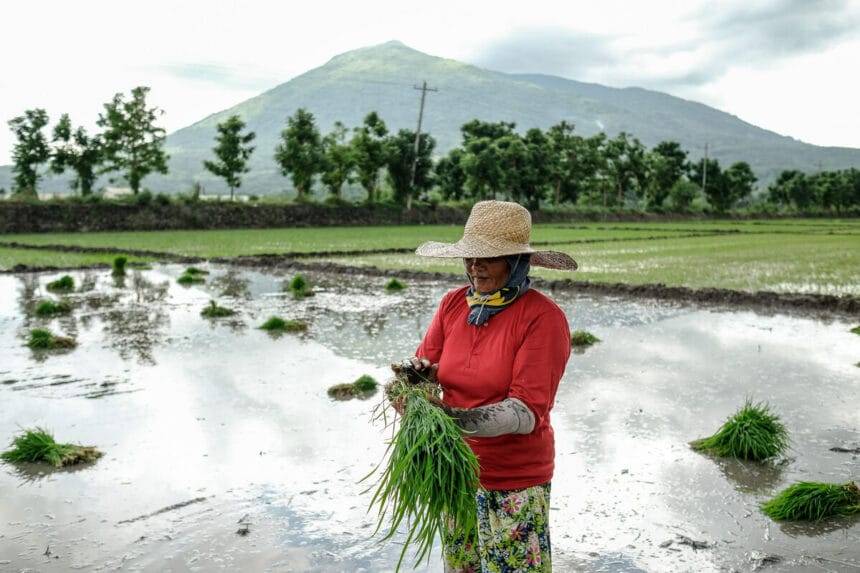Main Points In Hindi (मुख्य बातें – हिंदी में)
-
नया कार्यक्रम का उद्देश्य: संयुक्त राष्ट्र के खाद्य और कृषि संगठन (एफएओ) और अंतर्राष्ट्रीय कृषि विकास कोष (आईएफएडी) ने एक कार्यक्रम शुरू किया है जिसका लक्ष्य वैश्विक कृषि खाद्य प्रणालियों को टिकाऊ, प्राकृतिक, लचीला, और प्रदूषण मुक्त बनाना है।
-
वित्तपोषण विवरण: इस कार्यक्रम को वैश्विक पर्यावरण सुविधा (जीईएफ) द्वारा 282 मिलियन अमेरिकी डॉलर का वित्तपोषण प्राप्त हुआ है, और इसके माध्यम से 1.8 बिलियन अमेरिकी डॉलर के सह-वित्तपोषण की भी उम्मीद है, जो खाद्य सुरक्षा और जैव विविधता सहित कई लाभों को सुनिश्चित करेगा।
-
लक्ष्य क्षेत्र: कार्यक्रम चार मुख्य कृषि खाद्य क्षेत्रों को लक्षित करता है: फसलें (जैसे मक्का, चावल), वस्तुएं (जैसे कोको, ताड़ का तेल), पशुधन, और जल कृषि, और यह 32 देशों में लागू किया जाएगा।
-
पर्यावरणीय फायदें: इस कार्यक्रम का उद्देश्य मीथेन उत्सर्जन को कम करना, वनों की कटाई रोकना, जलीय कृषि को बढ़ावा देना, और दीर्घकालिक पर्यावरणीय और आर्थिक लाभ सुनिश्चित करना है।
- वैश्विक सहक्रियाशीलता: यह कार्यक्रम कई सम्मेलन और वैश्विक पहलों के अंतर्गत कार्यान्वित किया जाएगा, जिसका उद्देश्य कृषि खाद्य प्रणालियों के वित्तपोषण और उनके योगदान को बढ़ाना है।
Main Points In English(मुख्य बातें – अंग्रेज़ी में)
Here are the main points regarding the newly launched program by the FAO and IFAD:
-
Program Overview: The Food Systems Integrated Program (FSIP) has been launched by the Food and Agriculture Organization (FAO) and the International Fund for Agricultural Development (IFAD) to transform global agricultural food systems from farm to table into sustainable, resilient, and pollution-free systems. It aims to strengthen these efforts in 32 countries.
-
Funding and Goals: Funded by the Global Environment Facility (GEF) with $282 million, the program is expected to generate an estimated $1.8 billion in co-financing. Its goals focus on improving food security, nutrition, and livelihoods, while also providing global environmental benefits like enhancing biodiversity and addressing climate change.
-
Target Areas: The FSIP targets various agricultural sectors, including crops (maize, rice, and wheat), commodities (cocoa, palm oil, and soy), livestock, and aquaculture. The program aims to promote sustainable practices and reduce greenhouse gas emissions in these sectors.
-
Policy and Practice Development: The program will help countries and communities develop and strengthen policies, value chains, practices, and investment plans in key agricultural areas. It emphasizes alternative protein sources like aquaculture and integrated landscape management for crops.
- Integrated Efforts for Sustainability: The FSIP is part of broader global initiatives, aligning with commitments to biodiversity, climate change, and land degradation neutrality. It seeks to create a coordinated approach to ensure sustainable food systems that can withstand environmental and economic challenges, while also addressing interconnected global issues.


Complete News In Hindi(पूरी खबर – हिंदी में)
रियाद – संयुक्त राष्ट्र के खाद्य और कृषि संगठन (एफएओ) और अंतर्राष्ट्रीय कृषि विकास कोष (आईएफएडी) ने आज एक नया कार्यक्रम शुरू किया, जिसका उद्देश्य वैश्विक कृषि खाद्य प्रणालियों को खेत से टेबल तक बदलने के प्रयासों को मजबूत करना है, ताकि वे टिकाऊ, प्राकृतिक हों। सकारात्मक, लचीला, समावेशी और प्रदूषण मुक्त।
वैश्विक पर्यावरण सुविधा (जीईएफ) द्वारा वित्त पोषित, खाद्य प्रणाली एकीकृत कार्यक्रम (एफएसआईपी) को कृषि खाद्य प्रणाली दिवस पर लॉन्च किया गया था। 16वां मरुस्थलीकरण से निपटने के लिए संयुक्त राष्ट्र कन्वेंशन के दलों का सम्मेलन (यूएनसीसीडी सीओपी16) रियाद, सऊदी अरब में।
यह कार्यक्रम जीईएफ वित्तपोषण में 282 मिलियन अमेरिकी डॉलर और बेहतर खाद्य सुरक्षा, पोषण और आजीविका के सामाजिक आर्थिक लाभों के साथ-साथ जैव विविधता, भूमि और जलवायु परिवर्तन के लिए वैश्विक पर्यावरणीय लाभों के लिए अनुमानित 1.8 बिलियन अमेरिकी डॉलर का सह-वित्तपोषण करेगा।
कार्यक्रम चार क्षेत्रों की कृषि खाद्य प्रणालियों को लक्षित करता है – फसलें (मक्का, चावल और गेहूं), वस्तुएं (कोको, पाम तेल और सोया), पशुधन, जलीय कृषि – 32 देशों में: अंगोला, अर्जेंटीना, बेनिन, भूटान, बुर्किना फासो, चाड, चिली , चीन, कोस्टा रिका, इक्वाडोर, इस्वातिनी, इथियोपिया, घाना, ग्रेनाडा, भारत, इंडोनेशिया, कजाकिस्तान, केन्या, मलेशिया, मैक्सिको, नामीबिया, नाउरू, नाइजीरिया, पाकिस्तान, पेरू, फिलीपींस, सोलोमन द्वीप, दक्षिण अफ्रीका, श्रीलंका, तंजानिया, तुर्किये और युगांडा।
कार्यक्रम के माध्यम से देश और समुदाय प्रमुख कृषि खाद्य क्षेत्रों के लिए नीतियों, मूल्य श्रृंखलाओं, प्रथाओं और निवेश योजनाओं को विकसित और मजबूत करेंगे। कार्यक्रम का उद्देश्य पशुधन और चावल क्षेत्रों में मीथेन उत्सर्जन को कम करना है, साथ ही पशुधन और ताड़ के तेल क्षेत्रों में वनों की कटाई करना है। कार्यक्रम प्रोटीन और आय के वैकल्पिक स्रोत के रूप में जलीय कृषि को बढ़ावा देगा और गेहूं और मक्का के उत्पादन में अस्थिर भूमि उपयोग के विकल्प के रूप में एकीकृत परिदृश्य प्रबंधन को बढ़ावा देगा। इसके अलावा, यह दीर्घकालिक पर्यावरणीय और आर्थिक लाभ सुनिश्चित करने के लिए प्रमुख वस्तुओं के लिए टिकाऊ प्रथाओं का भी समर्थन करेगा।
यह कार्यक्रम हाल ही में तीन अलग-अलग सम्मेलनों के लिए संयुक्त राष्ट्र पर्यावरण सम्मेलन पार्टियों (सीओपी) में खाद्य और कृषि प्रणालियों की प्रमुख भूमिका पर बढ़ते अंतरराष्ट्रीय ध्यान के बीच आया है। इनमें का लॉन्च भी शामिल है कृषि-एनबीएसएपी पहल पर सीबीडी COP16 जैव विविधता के लिए, और हार्मोनिया पहल शुरू की गई यूएनएफसीसीसी COP29 जलवायु के लिए. सभी तीन सीओपी में वित्तपोषण पर प्रमुखता से चर्चा हुई है – कृषि खाद्य प्रणालियों का योगदान कुल वैश्विक जलवायु वित्त (2019/2020) का 5% से कम और कुल जलवायु-संबंधित विकास वित्त (2022) का 23 प्रतिशत है, जो कि 37% से गिरावट है। पिछला दशक.
खाद्य प्रणाली एकीकृत कार्यक्रम खाद्य प्रणालियों पर वैश्विक कार्यक्रमों में लगभग एक दशक के जीईएफ निवेश पर आधारित है अच्छी विकास साझेदारी, लचीली खाद्य प्रणालियाँ और यह खाद्य प्रणाली, भूमि उपयोग, और बहाली प्रभाव कार्यक्रम. के बाद स्वीकृत और डिज़ाइन किया गया संयुक्त राष्ट्र खाद्य प्रणाली शिखर सम्मेलनएफएसआईपी कार्यक्रम देशों को कुनमिंग-मॉन्ट्रियल वैश्विक जैव विविधता ढांचे, जलवायु परिवर्तन पर पेरिस समझौते और भूमि क्षरण तटस्थता के लिए प्रतिबद्धताओं को पूरा करने में सहायता करेगा।
वैश्विक समन्वय परियोजना अगले 12 महीनों में 32 देशों की परियोजनाओं के डिजाइन और लॉन्च का समर्थन करेगी। नीति और शासन, निजी क्षेत्र और निवेश, परिदृश्य-स्तर – कृषि भूमि, कृषि वानिकी स्थल और अन्य गैर-संरक्षित क्षेत्रों – नवाचार और ज्ञान प्रबंधन पर वैश्विक समन्वय केंद्र अभ्यास के समुदायों का निर्माण करेंगे और अधिक से अधिक उत्पादन के लिए कार्यक्रम की अवधि के दौरान समन्वय बढ़ाएंगे। व्यक्तिगत देश की परियोजनाओं के योग से अधिक प्रभाव।
उद्धरण:
संयुक्त राष्ट्र के खाद्य और कृषि संगठन के महानिदेशक एफएओ – क्यू डोंगयु ने कहा: “कृषि खाद्य प्रणाली लोगों और ग्रह के लिए प्रमुख परस्पर जुड़ी चुनौतियों का समाधान रखती है। वैश्विक जैव विविधता ढांचा, पेरिस समझौता और एसडीजी कृषि खाद्य प्रणाली परिवर्तन के बिना अप्राप्य हैं। फ़ूड सिस्टम्स इंटीग्रेटेड प्रोग्राम कृषि-खाद्य समाधानों को क्रियान्वित करने और निवेश को स्केलेबल परिणामों की ओर ले जाने का अवसर प्रदान करता है। एफएओ वैश्विक कृषि खाद्य प्रणालियों को अधिक कुशल, समावेशी, लचीला और टिकाऊ बनाने के लिए निजी क्षेत्र और विभिन्न क्षेत्रों सहित सदस्यों, किसानों, उत्पादकों, उपभोक्ताओं और भागीदारों के साथ काम करने के लिए प्रतिबद्ध है: बेहतर उत्पादन, बेहतर पोषण। , बेहतर पर्यावरण और बेहतर जीवन – किसी को भी पीछे न छोड़ें।”
आईएफएडी – इंटरनेशनल फंड फॉर एग्रीकल्चरल डेवलपमेंट के अध्यक्ष अल्वारो लारियो ने कहा: “खाद्य प्रणाली एकीकृत कार्यक्रम खाद्य प्रणालियों को अधिक टिकाऊ और लचीला बनाने के लिए एक परिवर्तनकारी पहल है, और यह सुनिश्चित करने के लिए कि छोटे पैमाने के किसान एक तिहाई का उत्पादन जारी रख सकें। जलवायु परिवर्तन की अनिश्चितता के बावजूद भी विश्व का भोजन। “
जीईएफ – ग्लोबल एनवायरनमेंट फैसिलिटी के सीईओ और चेयरपर्सन कार्लोस मैनुअल रोड्रिग्ज ने कहा: “वैश्विक कृषि-खाद्य प्रणालियाँ स्वास्थ्य, खाद्य सुरक्षा, पोषण और आर्थिक समृद्धि के लिए महत्वपूर्ण हैं, लेकिन यह वनों की कटाई, जैव विविधता हानि, भूमि क्षरण और ग्रीनहाउस गैस उत्सर्जन का कारण भी बनती हैं। चूँकि हमारी चुनौतियाँ आपस में जुड़ी हुई हैं, इसलिए उन्हें एकीकृत समाधान की आवश्यकता है। खाद्य प्रणाली एकीकृत कार्यक्रम और अन्य पहलों के माध्यम से, जीईएफ एक स्थायी खाद्य प्रणाली बनाने में महत्वपूर्ण भूमिका निभाता है – उत्पादन से उपभोग तक स्थिरता सुनिश्चित करना, वनों की कटाई के बिना कृषि वस्तुओं का उत्पादन करना, मिट्टी और ख़राब परिदृश्यों को फिर से जीवंत करना और नकारात्मक बाहरीताओं को कम करना।
Complete News In English(पूरी खबर – अंग्रेज़ी में)
Funded by the Global Environment Facility (GEF), the Food Systems Integrated Program (FSIP) was introduced on World Food Systems Day at the 16th Conference of the Parties to the United Nations Convention to Combat Desertification (UNCCD COP16) held in Riyadh, Saudi Arabia.
This program will provide $282 million in GEF funding, leveraging an estimated $1.8 billion in co-financing to enhance food security, nutrition, and livelihood benefits while addressing global environmental issues like biodiversity, land, and climate change.
The program targets agricultural food systems in four areas: crops (maize, rice, and wheat), commodities (cocoa, palm oil, and soy), livestock, and aquaculture across 32 countries, including Angola, Argentina, Benin, Bhutan, Burkina Faso, Chad, Chile, China, Costa Rica, Ecuador, Eswatini, Ethiopia, Ghana, Grenada, India, Indonesia, Kazakhstan, Kenya, Malaysia, Mexico, Namibia, Nauru, Nigeria, Pakistan, Peru, the Philippines, Solomon Islands, South Africa, Sri Lanka, Tanzania, Turkey, and Uganda.
Through this program, countries and communities will develop and strengthen policies, value chains, practices, and investment plans for important agricultural sectors. The program aims to reduce methane emissions in livestock and rice sectors and deforestation in palm oil and livestock sectors. It will promote aquaculture as an alternative source of protein and income, while also encouraging integrated landscape management for crops like wheat and maize. Furthermore, the program will support sustainable practices for key commodities to ensure long-term environmental and economic benefits.
This initiative has emerged amid increasing international attention on the role of food and agriculture systems during three recent UN environmental conferences. These include the launch of the Agriculture-NBSAP Initiative at the CBD COP16 for biodiversity and the launch of the Harmonia Initiative at the UNFCCC COP29 for climate issues. All three COP meetings have prominently discussed funding, noting that the contribution of agricultural food systems to global climate finance is less than 5% (2019/2020) and 23% of total climate-related development finance (2022), showing a decline from 37% in the past decade.
The FSIP is built upon almost a decade of GEF investments in global food system programs, including Good Growth Partnership, Resilient Food Systems, and Food Systems, Land Use, and Restoration Impact Program. After being approved and designed following the UN Food Systems Summit, the FSIP will assist countries in meeting commitments related to the Kunming-Montreal Global Biodiversity Framework, the Paris Agreement on climate change, and land degradation neutrality.
The global coordination project will support the design and launch of projects in 32 countries over the next 12 months. It will focus on policy and governance, private sector investment, and innovations in landscape-level agriculture, agroforestry sites, and other non-protected areas, building a community of practices to increase coordination and amplify the impact of individual country projects.
Quotes:
The Director-General of FAO, Qu Dongyu, stated: “Agricultural food systems hold solutions to interconnected challenges for people and the planet. The global biodiversity framework, the Paris Agreement, and the SDGs cannot be achieved without transforming agricultural food systems. The Food Systems Integrated Program provides an opportunity to implement agricultural-food solutions and direct investments towards scalable results. FAO is committed to working with members, farmers, producers, consumers, and partners from different sectors to make global agricultural food systems more efficient, inclusive, resilient, and sustainable: better production, better nutrition, better environment, and better life – leaving no one behind.”
Alvaro Lario, President of IFAD, remarked: “The Food Systems Integrated Program is a transformative initiative aimed at making food systems more sustainable and resilient, ensuring that smallholder farmers can continue to produce a third of the world’s food even amidst climate change uncertainties.”
Carlos Manuel Rodriguez, CEO and Chairperson of GEF, said: “Global agricultural-food systems are crucial for health, food security, nutrition, and economic prosperity, but they also contribute to deforestation, biodiversity loss, land degradation, and greenhouse gas emissions. Since our challenges are interconnected, they require integrated solutions. Through the FSIP and other initiatives, GEF plays a vital role in creating a sustainable food system that ensures sustainability from production to consumption, eliminates deforestation from agricultural goods, revitalizes soils and degraded landscapes, and minimizes negative externalities.”




